It was about ten years ago and my band, Revilement, was headed down the highway. We rented a van, hired a driver. With an early afternoon start the four of us in the band along with our manager (my girlfriend, Jill, now wife) and Larry Wang, then bassist for Beyond Cure, who came to sling merch for us and hype up the crowd the way only he can, were bound for a weekend gig in Taichung, our first time playing Taiwan's central city.
On the way south, aside from blasting Cannibal Corpse and Dying Fetus, much to our sexagenarian driver's chagrin, Larry told us about the local band that would be opening the show, a group called Flesh Juicer. He'd met them during his military service days in Taichung, helped get them started. They were up-and-comers, he said, young kids with a lot of potential, on their way to finding their own sound, picking the fragments of it from a broad range of influences.
Flesh Juicer, it turned out, had just released their first EP, A Morbid State, a mix of deathcore and metalcore riffage slung with a side of brutal vocals, sung in Hokkien, performed by a lead singer, known as Gigo who never appeared without wearing an ultra-realistic pig head, scrupulously obscuring his real identity (a calling card born of equal parts cultural influence and Gigo hoping to hide the fact that he was in a band from his conservative parents). This being a metal conversation sometime around 2009, the word "sick" probably came up more than once. How right Larry was.
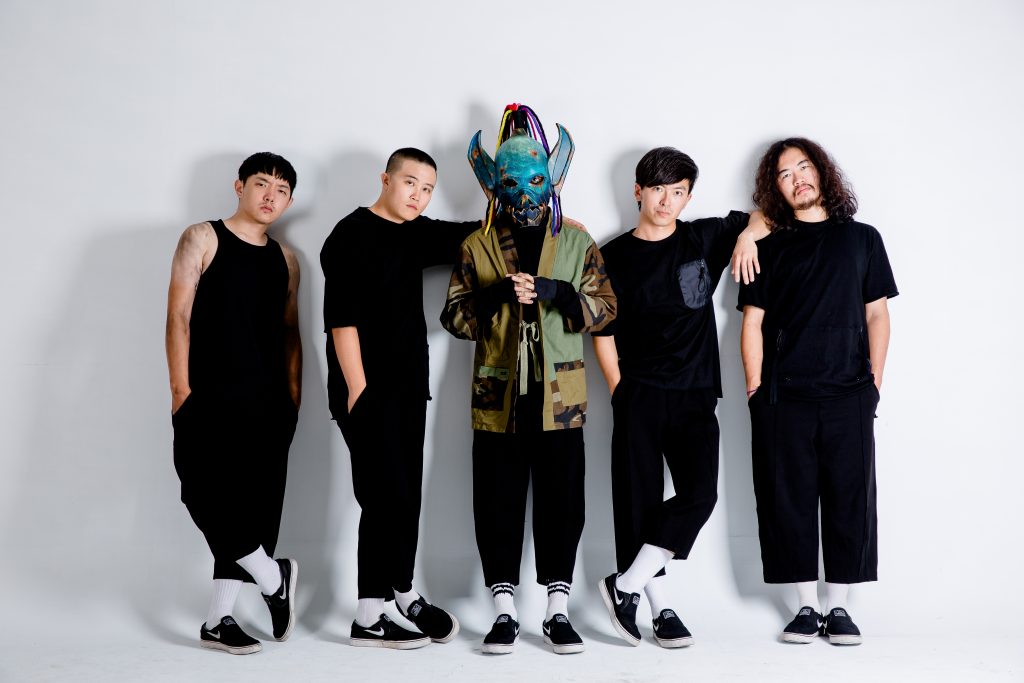
(Photo courtesy of Flesh Juicer)
A decade later, Flesh Juicer don't open for anyone. Not in Taiwan, anyway. In spite of their modest claims to the contrary, they are an established brand at home, and increasingly abroad, putting their name up with the likes of Chthonic and Infernal Chaos when it comes to cultivating a rabid following. But flash back to 2006, when Gigo and guitarist Qing, friends since high school, were trying to get Flesh Juicer off the ground in a city that had a strong punk tradition thanks to the collective known as the Feirenbang, or Useless Motherfuckers, but not much in the way of a metal scene.
"The most difficult thing was to get heard," recalls Gigo. "Public events for bands were scarce and far between. It was a totally different time. But things got a whole lot better after 2009, in part thanks to the rise of social media. Annual music events that were targeted to the audience in Taichung started gaining traction and new groups and artists were given opportunities like never before."
There were lineup changes early on in the band's life, Qing and Gigo the lone holdouts from the original incarnation. In 2009, guitarist Zero joined, the man who would come to pen 90 percent of the band's music. How he joined was that in 2008 he was known as one of Taichung's mot notorious slammers, in the thick of the pit at every show. It also just so happened that he was a guitar player with a knack for heavy, hooky riffs, and who comes from a family with close ties to Taiwanese temple culture and folk religion. With Zero in the mix it was then that the musicians from central Taiwan, a place where the Taiwanese language might be heard as often as Mandarin, and where traditional Taiwanese culture and songs play perhaps a stronger role in daily life than they might further to the north, decided to work those surrounding elements into their music.
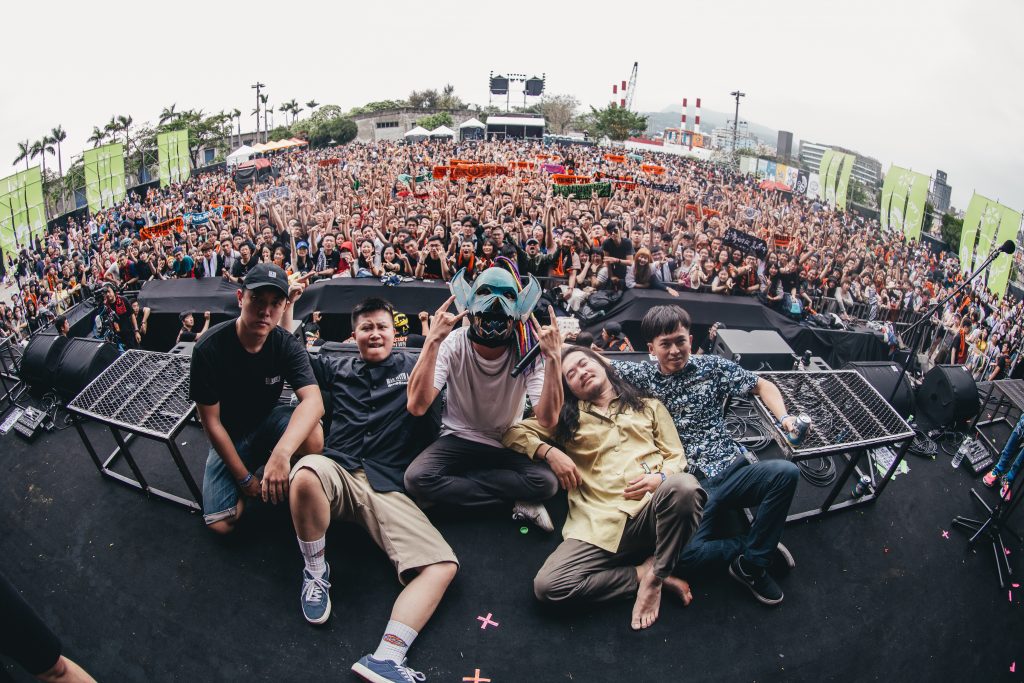
Flesh Juicer performed at the 2019 Megaport Festival. (Photo courtesy of Flesh Juicer)
"A Morbid State actually attempted to work the Taiwanese elements in," Gigo explains. "But the pieces lacked a strong central theme and we did not set any particular goals to work toward. So sometimes you'd see songs borrowing bits and pieces of Western metal. There was no strong emphasis on writing in Hokkien at the time. 'Slaughter' would be the song on that EP where we tried to work in the traditional Taiwanese theme, most obviously via the arrangement of the drums."
From then on, Flesh Juicer continued to divine further into the roots of their native culture, exploring the rituals, pageantry, and music most often associated with Taiwan's local temple fairs, events staged to pay tribute to Buddhist Bodhisattvas and Buddhas as well as Taoist deities. The pig head mask worn by Gigo is a concept taken from the Pigs of God festivals held in Taiwan throughout the year, where giant sacrificial swine, fattened up to gargantuan weights of a thousand kilograms, are paraded through the streets, then sacrificed to the gods. This cultural practice and others like it were to be the focus of the band's second EP, 2011's The Brutal Taichung.
"The Brutal Taichung was an EP with a strong character," says Gigo of the band's sophomore effort. "After a careful listen of our 2009 EP, we felt like writing something that's closer to our lives. So we decided to write in the pentatonic language. 'Tour of Inspection' would be what I call a successful interpretation of Taiwanese temple fair culture. After that, use of the language became a foundation for all of our songs to build upon."
With a second EP under their belts and a core sound forged in the crucible of rehearsals and live performances, Flesh Juicer were quickly becoming burgeoning force in the Taiwan metal scene, getting the call to perform on some of the country's biggest club and festival stages. But the biggest call to date came in 2013, when Chthonic, unarguably Taiwan's biggest metal export, asked if Flesh Juicer would mind opening up for them...in Germany.
At the time, the band had never played outside Taiwan. Now, they were headed to a country where metal is less a genre than it is an official language, the home of Teutonic thrash and Wacken Open Air, the world's biggest metal festival. It was, to say the least, a daunting task, one the band recalls with nothing but fond memories.
"Aw, that was great," says Gigo. "It was our first gig abroad and I distinctly recall how surreal it felt to just be on that flight. I mean, who'd have thought this casual band could make it to the world stage? And the German fans were great. They didn't make us feel any lesser for being the warm-up band. Some even came to us after the show to offer us words of encouragement and told us how they'd like to see us perform again, nice things like that. We actually got to know some of them and hung out when they later came to visit Taiwan."
In the afterglow of Germany, however, there was a dose of reality. Where the band could have used the experience to feed their egos, they instead treated it as an exercise in humility.
"That experience made us realize how far we still are from what would pass as world-class," says Gigo of what the band took away from the experience. "Truth be told, we feel like we're getting schooled every time we perform abroad. We're still not quite there yet. There's a long way ahead of us and we need to work even harder to get there, to be recognized on the international arena."
After two EPs, the next logical step was to release a full-length album. There was a concept, something the band had been toying with since 2010. And in fact, there was a long-view strategy in place already, something any band with longevity in mind has to have if they want to secure their place among the elite not just now, but for years to come.
"It took us five years to prepare for the album because it was the first time we worked on something like that," says Gigo of the writing process for the alum, also known as GIGO, the band's 2015 debut LP. “It took so long because we had a big story in mind and it took quite a while to have the structure down."
The lyrical concepts of GIGO centered around the idea of space, as in outer space—a sort of Taiwanese sci-fi epic surrounding the universal balance between the five ancient elements: metal, wood, water, fire, and earth. Each element, according to the album's storyline, has its own cosmos within a five-phase universe, but a sixth is created to absorb the impurities of the other five; all the evil, selfishness and greed. It is a desolate place with no signs of life, until one day, after millions of years of entropy, the evil cannot be contained. It spills out, spreading like a virus throughout the universe in the form of the Lord of Evil. And so it falls to a lone hero, the Watcher of the Five, to fight against this terrible plague. This, it turns out, is just part one of a planned three-act epic.
"We plan to release three albums built around three themes: space, ocean, and something yet to be announced," says Gigo.
GIGO saw the band make use of traditional Taiwanese instruments such as the suona, a reed instrument, in songs like "Lunar Impact," "Funeral," and "Flesh Temple." It was small touches such as this in addition to the band's deep dive into their own culture that set them apart in the local scene, which in turn set the stage for them to make their mark internationally. The years 2015 through 2017 were heady times for Flesh Juicer. Some of Asia's biggest metal festivals came calling. The band was riding high.
"In that period, we got to perform Indonesia's Hammer Sonic and two of the three biggest festivals in Japan: SUMMER SONIC and LOUD PARK," says Gigo with his usual penchant for downplaying the band's highs or achievements.
But then, following a stop-gap EP, Black: Messages, came the highly anticipated release of the band's second album, the sea section of the aforementioned trilogy, 2018's Fairy Tales of the Ocean Deep. The album was centered around the ocean as living entity, fighting back against humanity as the human race does its level best to pollute and choke the life out of the seven seas.
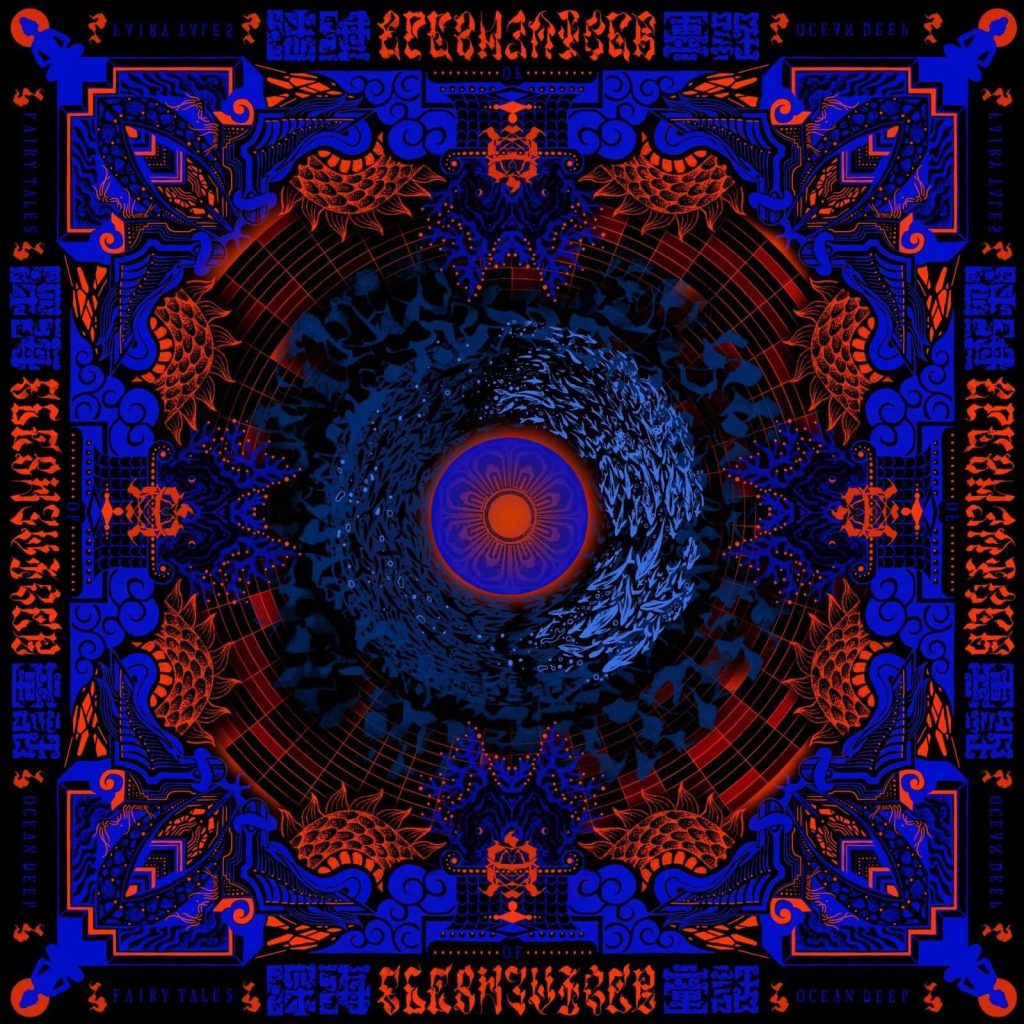
The artwork of Fairy Tales of the Ocean Deep. (Photo courtesy of Flesh Juicer)
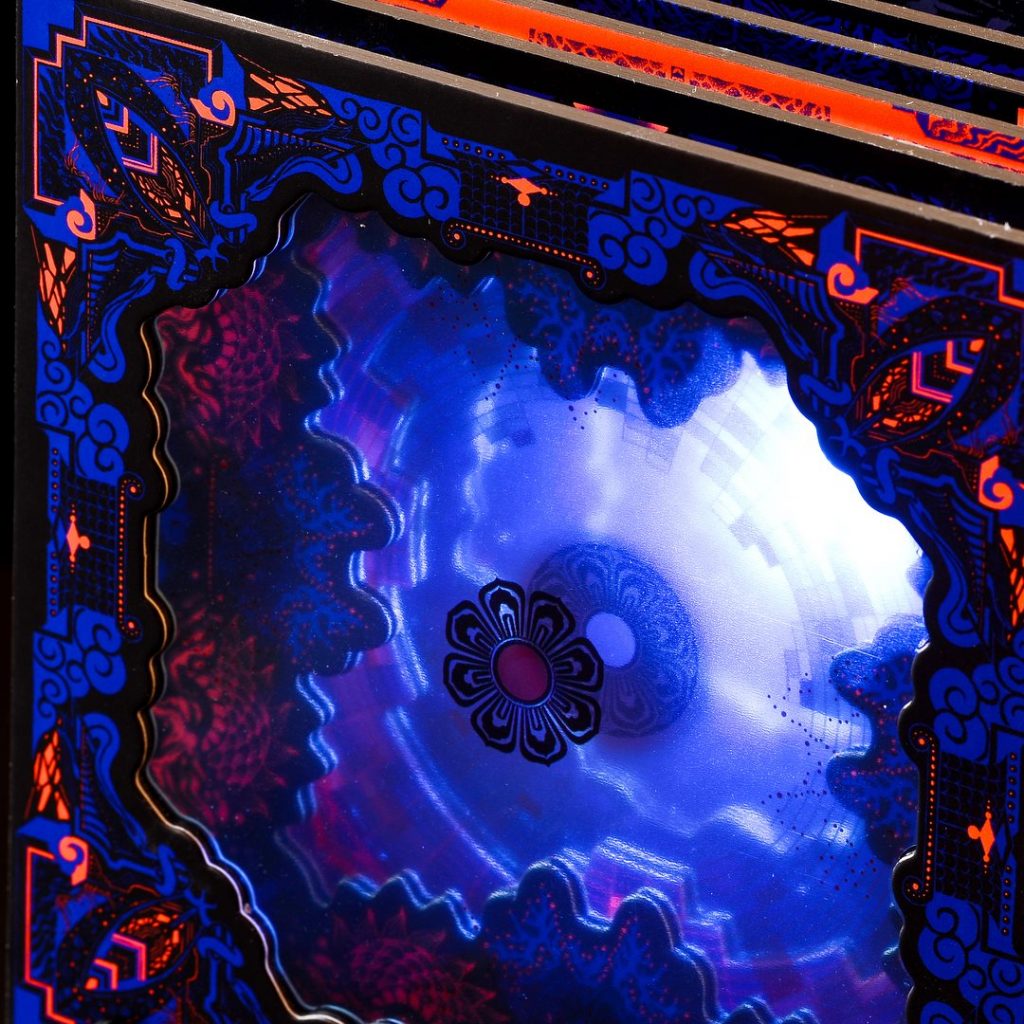
The artwork of Fairy Tales of the Ocean Deep. (Photo courtesy of Flesh Juicer)
Excitement surrounding the band was at an all-time high, given the band's recent success and high profile tours throughout the Asia region. GIGO had brought the band national attention, winning them the 2015 prize for Best Rock Album at the Golden Indie Music Awards. Two years later, they took home the Golden Indie Statue for Best Live Performance. Multiple wins put the band on a pedestal, raising expectations to new heights. Those expectations, as it turned out, may have been raised impossibly high. When Fairy Tales of the Ocean Deep came out, the response was tepid compared to the furor surrounding GIGO, putting a temporary halt to Flesh Juicer's steady ascent, leading the band members into a black hole of in-fighting and introspection.
"2018 was kind of a dark year for us," says Gigo. "Fairy Tales of the Ocean Deep did not do as well as we'd anticipated. Some of us were having personal difficulties in their lives. We were constantly fighting with each other... yeah, that was a dark year."
Still, there was a silver lining to be found in the band's dogged commitment to releasing albums that are not only unique musical experiences, but visually engaging ones as well. Over the years, Flesh Juicer has teamed with a local graffiti crew, Virus No. 6, and its core members Black Zao and Szeak, along with former member DABU, who have all contributed to the band's album packaging designs as well as their merch layouts. As it was with the music, the artists incorporated elements of Taiwanese temple fair culture within the framework of their own style seen on city wall bombs, throw-ups, tags and murals in locales throughout Taiwan. The collaboration bore fruit earlier this year, when Fairy Tales of the Ocean Deep won Best Album Design at the 2019 Independent Music Awards in New York. An album's packaging, says Gigo is an essential part of selling the product, especially in the digital age, a nod to the band's business savvy.
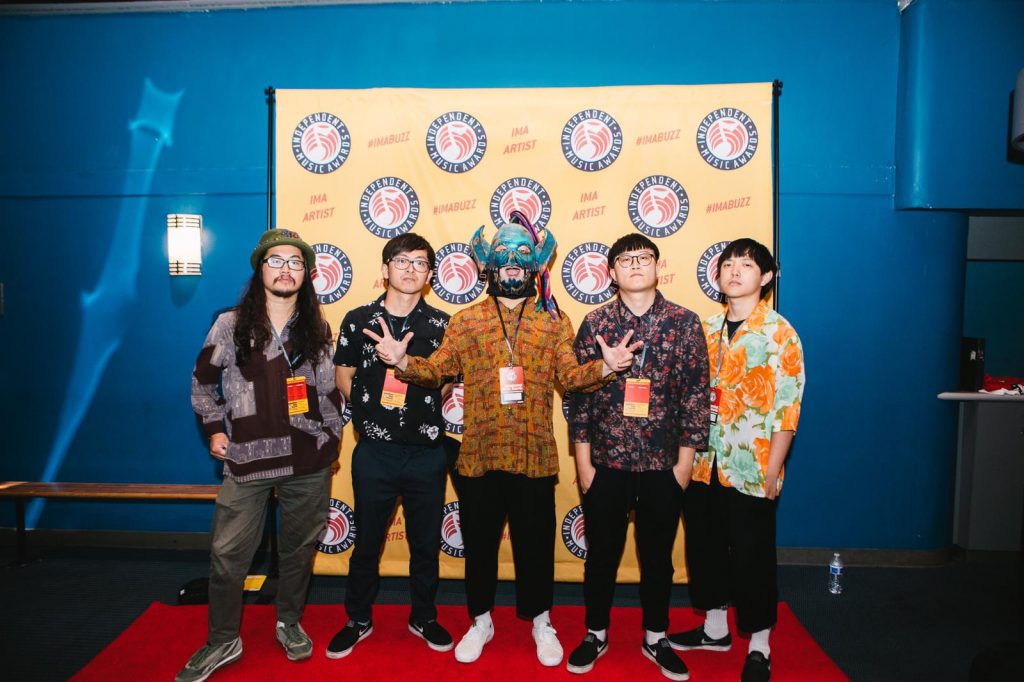
Flesh Juicer posed at the Independent Music Awards ceremony. (Photo courtesy of Flesh Juicer)
"We now have so many music streaming services around that it's almost impossible to sell physical records without putting in some ingenuity in the packaging. It's something that we had realized quite early on, during the planning phase of the three-part structure, actually. The idea was to make the album so awesome that it's not a problem of whether people would buy it, but if they'd buy it quick enough before they're all sold out. And this award is a recognition of our commitment to physical records. Our first album went of stock in six months and that was it. No more."
Now, the focus moves to the third part of the trilogy, the next chapter in Flesh Juicer's continuing evolution. No band gets this far without forethought. No core of musicians manages to stay together for well over a decade without being comfortable in their own skin, personally and artistically. Flesh Juicer as a quintet (now rounded out by bassist Jen and drummer Barry, who joined in 2015 and 2017 respectively) seems to have this well in hand. And so they push forward with the goal of branching out ever further, conquering new shores, and expanding the sound they've built to previously unfamiliar territory. The core, both musically and from a personnel standpoint, will remain intact. But as they have slowly added pieces of their culture to their music, so too do they plan to bring in new additions, metamorphosing into a different yet familiar beast.
"We will start writing bilingual lyrics to keep our dreams alive, move forward, and hope that through our music and lyrics, the world could get to know Taiwan better," says Gigo. "Tour the world, perform everywhere. Show people what Taiwan is about. Let them know how we put culture in our music. Let our art be heard."





